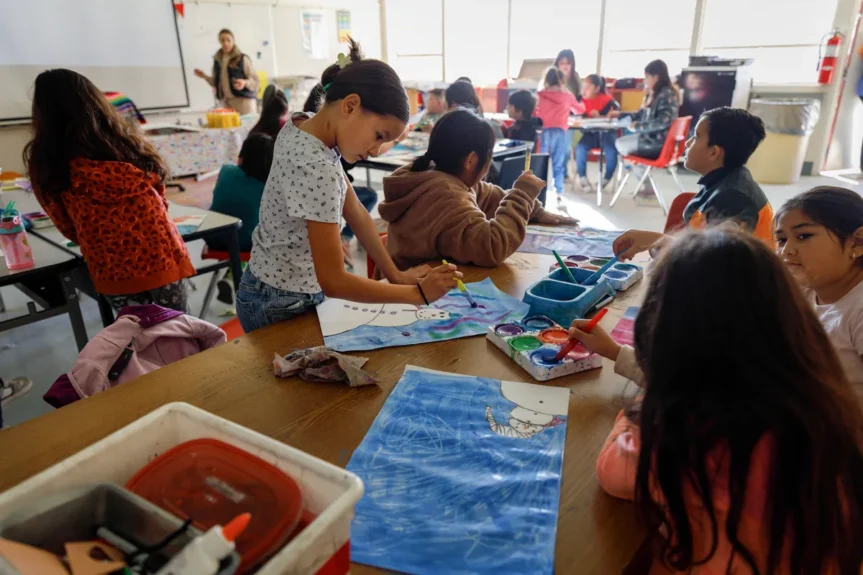It’s time for the Oakland Ed Week in Review!
We’re back with an of our roundup of education news from around The Town, the Bay Area, state, and nation for your weekend reading. This is a Dirk favorite and one of the last blogs he published for Great School Voices.

[Photo: Seven Shavers takes the bus home after her internship from Skyline High School in Oakland, California on February 28th, 2024. Credit: Katie Rodriguez in Oaklandside]
Here’s what’s been going on:
Here in Oakland A diverse array of news stories from Oakland includes an urban debate league empowering low-income students, a political watchdog uncovering violations in a children’s initiative campaign, a teenager sharing her daily commute experiences, a basketball championship between local high schools, a media academy receiving recognition from the California Department of Education, and the Oakland Unified School District celebrating School Social Work Week.
In the Greater Bay Area | A series of education-related news articles highlights various developments across the Bay Area, including the success of San Jose High’s robotics program driven by teamwork, the passage of Berkeley’s Measure H to support school programs, initiatives addressing mental health challenges in Bay Area schools, San Francisco’s approval of Proposition G to reintroduce Algebra 1 in middle schools, SFUSD’s consideration of school consolidation amid budget challenges, Alameda’s passing of Measure E to benefit public schools, an innovative science project by East Bay students testing textbooks as body shields, and a debate in Berkeley over a civil rights complaint regarding antisemitism allegations in schools. Additionally, San Francisco schools are abandoning a problematic payroll system after spending $34 million on it.
Throughout the State of California | Native American students face challenges leaving home for college despite aspirations, Voice of the Youth nonprofit in Sacramento organizes college tours to empower students, a literacy bill aims to change reading instruction, enrollment declines and budget shortfalls plague California schools, while cultural centers at universities aim to support Black students. Additionally, the rollout of FAFSA causes stress for Bay Area students, a school district changes its gender identity policy after legal action, and a teachers union withdraws support for an LAUSD candidate due to offensive social media activity.
Across the Nation | Latinx children are more prone to disease due to food insecurity, the SAT goes paperless for over a million students for the first time, FAFSA submissions from high school seniors are down 38%, Biden calls for teacher pay raises and expanded pre-K in the State of the Union, governors prioritize early childhood education and mental health in their 2024 State of the State addresses, and lawmakers remain divided over charter schools during a House hearing. Additionally, Congress curtails a move expanding Pell Grant access, Indianapolis Public Schools plans a new approach to teaching English learners, and data science education in Compton Unified School District is emphasized to increase opportunities for students of color. Finally, thousands of Philadelphia students are owed special education services from the pandemic, and D.C. is sued over its failure to bus kids with disabilities to and from school on time.
What did we miss? Hit us up in the comments below:
Oakland
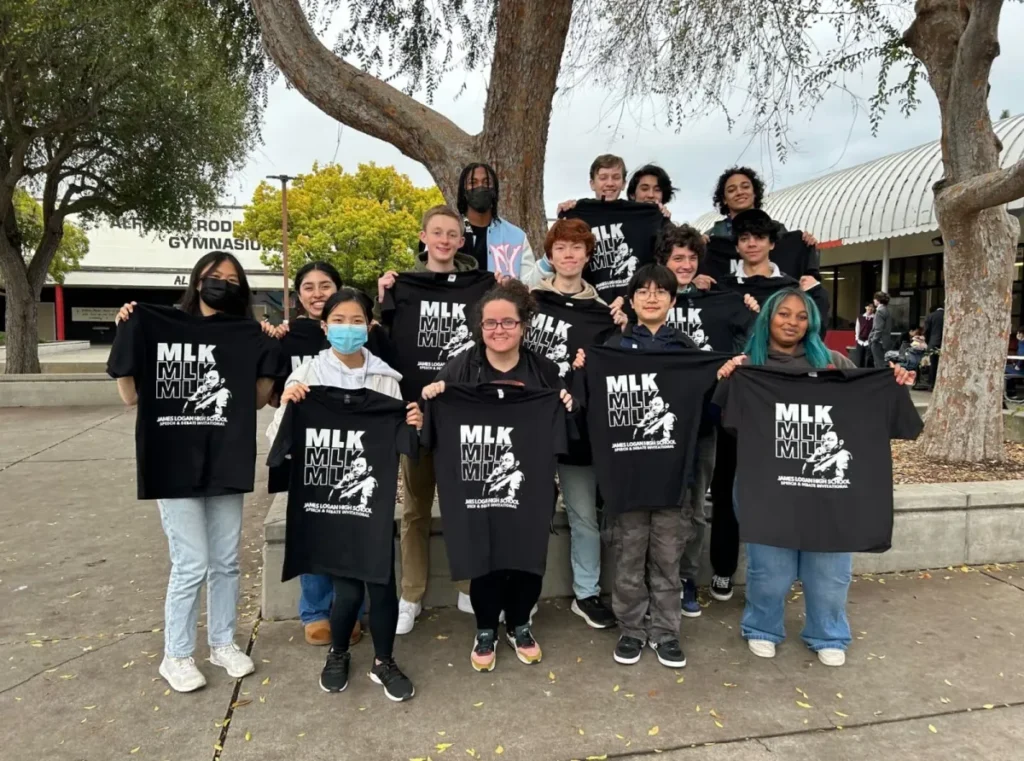
[Photo: Youth in the student leadership council of the Bay Area Urban Debate League participated in the James Logan Martin Luther King Jr Invitational in Union City. Credit: Mya Whitaker in Oaklandside]
Oakland debate group gives low-income students opportunities usually exclusive to private schools | The pandemic hindered participation in youth debate programs, but over the past two years, Whitaker has overseen an expansion of the organization to schools in Oakland, San Francisco, Emeryville, and Vallejo. In 2023, the Bay Area Urban Debate League served 300 middle and high school students. For the last three years, the organization has also hosted dozens of students at a summer debate camp on the Laney College Campus. By Ashley McBride for Oaklandside News
Oakland political watchdog finds serious violations by leaders of 2018 Children’s Initiative | Oakland Public Ethics Commission investigators are proposing to settle a case with Susan Montauk, a civic advocate who oversaw a campaign committee called “The Oakland Fund” that raised over $1.8 million to support 2018’s Measure AA, also called the Oakland Children’s Initiative. According to the investigators, an elected city official who was running for office that year convinced Montauk and another officer of The Oakland Fund, Eugene Zahas, to use the committee to back Measure AA, but none of them ever disclosed the elected official’s involvement to voters in campaign filings. Public ethics investigators say this arrangement ran afoul of state and city laws requiring candidates to be transparent about their control of ballot measure committees. By Eli Wolfe and Darwin BondGraham for Oaklandside News
From the flats to the hills and back: one Oakland teen’s daily commute | This story is part of a first-person series examining public safety and related issues in Oakland being produced in partnership with Oaklandside and El Tímpano, with support from the American Press Institute. 15-year-old “Seven” Shavers explains why she feels safe—and sometimes doesn’t—in her neighborhood and when taking the bus to school. By Seven Shavers for Oakland Voices
State champions! Oakland Tech routs Centennial-Bakersfield in dominant display
Oakland Tech’s standouts wowed the crowd with quick passes and electrifying finishes. By the end of Oakland Tech’s 79-55 CIF Division II state championship victory, the school’s trademark “O-T, Ohhhhhh-Teeeee” chants echoed throughout the building. “It means everything to me,” Oakland Tech coach Karega Hart said about the chants. “We take pride in being Bulldogs, and we take pride in being from Tech. But most of all, we take pride in being from the city of Oakland.”
By Joseph Dycus in the Mercury News
Fremont High School’s Media Academy Named Distinguished California Partnership Academy by the California Department of Education | The Media Academy was honored at the CPA Educating for Careers Conference luncheon this past Monday, March 4 in Sacramento. “You are one of the finest academies in California, and we at the California Department of Education could not be more proud of your accomplishment. Every day, teachers across the state work tirelessly to ensure students have the support they need to become engaged and productive citizens. It’s clear that the Fremont Media Academy rises above other academies,” said the California Department of Education. “It is exciting to see the success that the Fremont Media Academy and its students are having,” said Superintendent Kyla Johnson-Trammell. “OUSD’s focus is on ensuring that our high school students have excellent pathways, which truly connect their academic work with potential future careers. OUSD Newsroom
OUSD Celebrates School Social Work Week, and the Social Workers Who Support Students Every Day and showcases some of those social workers across the Town.
The Bay Area
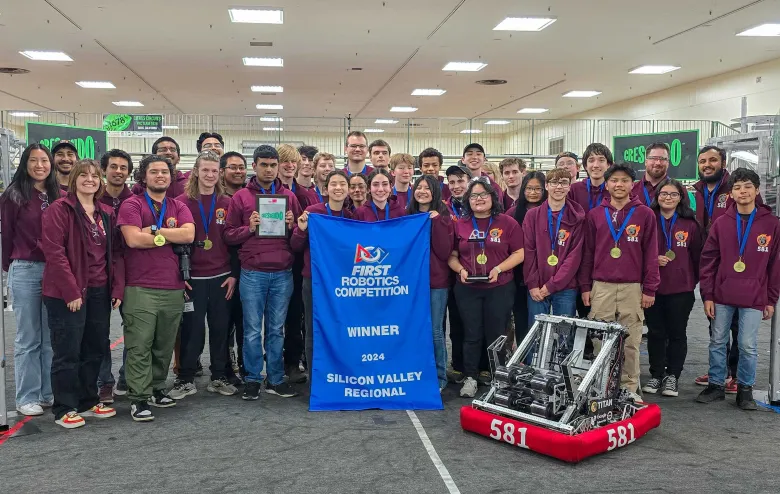
[Photo: The Blazing Bulldogs robotics team from San Jose High School at the FIRST Robotics Silicon Valley Regional at the Santa Clara County Fairgrounds on Sunday, March 3, 2024. Photo courtesy of Blazing Bulldogs Team 581 in the Mercury News]
Strong teamwork propels San Jose High’s robotics program to new heights | The Blazing Bulldogs robotics team were Regional Winners of a 42-team competition held at the Santa Clara County Fairgrounds. In 2023, the team ranked 22nd out of 3,294 teams worldwide based on robot performance, and it’s already ranked 10th this year. But Shelby Anderson, the team’s head coach, said the secret to its success has nothing to do at all with robotics. “It’s about creating a culture that encourages buy-in from every single member of our team on every single decision,” Anderson said. By Sal Pizzaro for Mercury News
Yes on H: Voters overwhelmingly approve Berkeley schools parcel tax | Measure H – The Berkeley school parcel tax funding small class sizes and enrichment programs will be renewed for another eight years – will slightly increase the tax rate of the special tax to 54 cents per square foot. The measure will pay for just under 20% of the district’s budget for the next eight years. But it won’t expand BSEP — just pay for the same programs given the rising costs of teaching and learning. It will come up for renewal again in 2032. “It’s continuing to provide all the things that the kids come home from school talking about,” said Nicole Chabot, a Berkeley parent and co-chair of the Yes on Measure H campaign. By Ally Markovich for Berkeleyside News
Students’ mental health challenges persist — Bay Area schools are doing something about it |
An eighth grader at Monroe Middle School in San Jose, was trying to get through her first class, but her anxiety was making it impossible to calm down. She couldn’t focus… So she asked her teacher for permission to leave and headed to the wellness center down the hall for a 15-minute break. The space is one of 19 wellness centers throughout Santa Clara County elementary, middle and high schools, providing students with a place to de-stress and learn coping strategies to help them get through the day. And it’s part of a growing trend as school districts across the Bay Area turn to a range of strategies to address a staggering crisis impacting young people around the country. Nearly 30% of teenagers experience episodes of poor mental health each month, and more than 40% have persistent feelings of sadness, according to a decade-long survey by the U.S. Centers for Disease and Prevention released in 2021. More more insight see article By Hannah Poukish for Mercury News
S.F. election: Prop G Algebra in middle schools measure passes | San Francisco voters sent a clear and decisive message to the city’s school board Tuesday, demanding through Proposition G that the district bring Algebra 1 back into middle schools. It was a resounding victory for parents, students and community groups that have been fighting for years to allow eighth graders to take the math course. “The citizens of San Francisco have spoken, publicly, with their votes that Algebra 1 must be offered to eighth graders,” said Rex Ridgeway, grandfather of a San Francisco Unified student. “And, it’s about time, after a decade of damage.” By Jill Tucker for San Francisco Chronicle
SFUSD considers consolidating, closing schools amid budget challenges | SFUSD is at a crossroads, confronting a structural budget crisis alongside declining enrollment. Fewer students means reduced state funding. “We’re looking at the way we staff our schools, our central office, our school programs, our facilities and also our school portfolio, and we’re recognizing that we need to have a new school portfolio with fewer schools, so we can better meet our goals for student outcomes,” said Superintendent Matt Wayne. By Christien Kafton for KTVU News
Alameda’s school tax Measure E passing with slim majority Wednesday | Alameda’s Measure E, a parcel tax benefiting the city’s public schools, was winning Wednesday morning by slightly more than the two-thirds majority… and would generate $24 million, or 20%, of the annual budget for the Alameda Unified School District (AUSD) for nine fiscal years starting July 1, 2025. “We are hopeful that we will maintain the margin that we need to pass this crucial revenue measure, and we hope that we will be able to announce soon that we can count on this $24 million in local funding over the next nine years,” said AUSD Superintendent Pasquale Scuderi. By Paul Kilduff for East Bay Times News
2 East Bay students’ science project tests books against bullets | Militar-Cross and Sofia Seiden want to set out to prove that their school books could double as body shield with their school science project called “high impact”. “Right now, the school protocol is to hide in the corner and turn off the lights with no defensive protection at all. But we think that textbooks, it’s a very common resource and it could be used as body armor,” Seiden said. By Jodi Hernandez for NBC Bay Area News
Berkeley students, teachers say civil rights complaint conflates antisemitism with criticism of Israel | At a packed Berkeley school board Wednesday night, pro-Palestinian students, parents and teachers pushed back against a federal civil rights complaint alleging “severe and persistent” antisemitism in Berkeley schools, arguing the complaint was aimed at stifling the right to “teach Palestine” in classrooms.The boardroom was standing room only, filled with people wearing keffiyehs and pro-Palestine T-shirts. On one side of the room, a handful of people held up signs with slogans like, “Believe Jewish Kids.” “I will not stand for the antisemitism, which we face, to silence voices calling for peace,” Xaro Kaufman, a senior at Berkeley High who is Jewish, said at the board meeting through tears. “If you are currently uncomfortable with your teachers and peers being pro-Palestine, it is not because they are antisemitic. It is because your views on Israel cloud your ability to see the genocide which is being committed.” By Ally Markovich for Berkeleyside News
S.F. schools abandon disastrous payroll system after spending $34M | After two years and $34 million trying to make a disastrous payroll system work, SF school officials are giving up and are ready to pay another $5.6 million to start over with another company. The EMPower payroll system has caused chaos since it was launched in January 2022, resulting in error-filled paychecks. The problems filtered into health and retirement benefits, leaving some employees temporarily without medical coverage and others without payments into pensions. The decision came less than a week after more than 100 teachers staged a sick-out, part of a citywide day of action by educators and staff regarding the payroll problems. By Jill Tucker of San Francisco Chronicle
The State of California
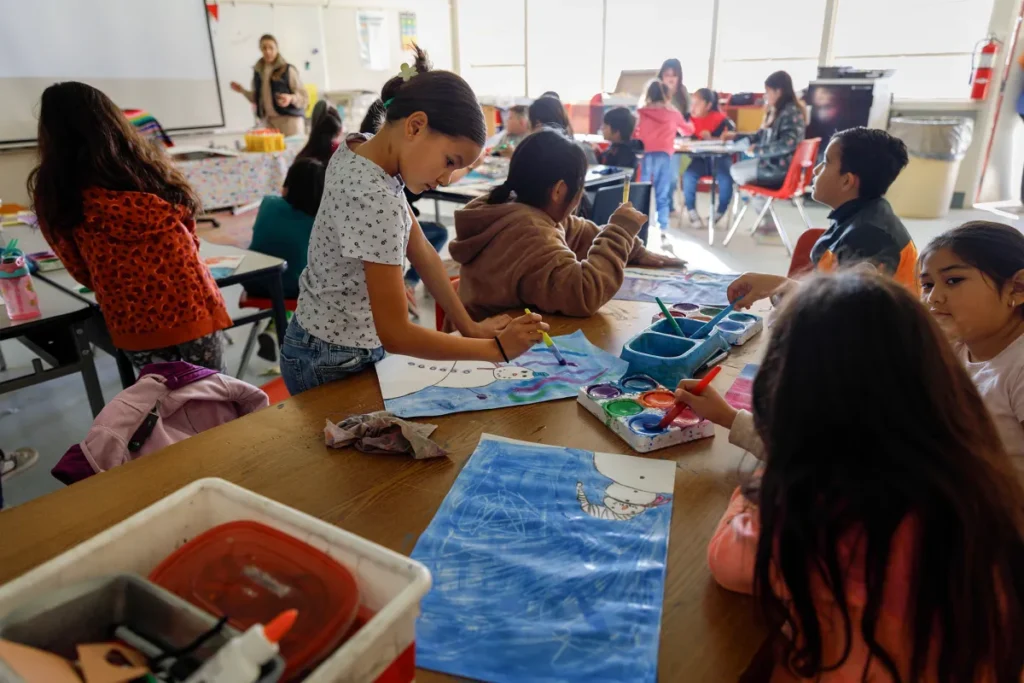
[Photo: Third grade students participate in an art class at San Pasqual Valley Unified School District at Winterhaven in Imperial County on Dec. 12, 2023. Photo by Kristian Carreon for CalMatters]
Despite college aspirations, Native American students find it hard to leave home | The challenges are reflected in the data. Native American students have a college-going rate that’s about half the rate of their peers in other racial or ethnic groups, and only 42% graduated from college within six years, compared to 64% for all students, according to the Post-Secondary National Policy Institute. Among K-12 students, Native Americans significantly trail their peers in nearly every educational indicator. California is trying to reverse that trend. It funds early childhood programs for Native children and two dozen education centers that provide tutoring and other services to ensure Native students are ready for college. By Carolyn Jones for Cal Matters
Sacramento nonprofit helps send kids on college tours, including HBCUs. Here’s what they learn |
Voice of the Youth is a nonprofit organization that provides mentorship and support to youth in the Sacramento region. The organization has hosted college tours, starting with Southern California institutions, since 2013, according to founder Berry Accius. After touring all the schools, student Malea Wallace said she was intrigued with Hampton’s campus and is looking into attending the school. “It helped by showing me the real experience from a student’s perspective,” Wallace said. “Our tour guides really helped and walked us through the campuses, showing us all the different resources and centers built for us. The whole experience made me feel more comfortable and ready to go to college, knowing that I won’t be alone.” By Marcus D. Smith for Sacramento Bee
How a “science of reading” approach could change early education in California | The Literacy Bill Introduced by Assemblywoman Blanco aims to overhaul how reading is taught in California schools. “I was 16 when I started high school… So reading was very tough for me” said Balnina Hernandez, whose son fell behind during the pandemic. Jasmine Viel’s video for CBS KCAL News dives into AB2222, a new literacy bill.
In related news, English learner advocates in California oppose ‘science of reading’ bill |
Two prominent California advocacy organizations for English learners – Californians Together and the California Association for Bilingual Education (CABE) – are firmly opposing a new state bill that would mandate that reading instruction be aligned with the “science of reading,” saying it could hurt students learning English as a second language. By Zaidee Stavely for Ed Source
California schools gained billions during COVID-19 pandemic. Now the money is running out | An end to billions of dollars in federal Covid relief funds, declining enrollment, staff raises, hiring binges and stagnant state funding should combine over the next few months to create steep budget shortfalls, with low-income districts affected the most. “The fiscal cliff is going to vary,” said Marguerite Roza, director of the Edunomics Lab at Georgetown University. “The districts that got the most Covid relief dollars, those that have the most low-income students, are going to face the biggest losses.” By Carolyn Jones for East Bay Times via Cal Matters
Fewer students and higher absenteeism plague California’s public school financing | California is one of only a few states that use attendance to distribute state aid. Proposition 98, a formula adopted by voters in 1988 that only a few wonks in and around the Capitol profess to understand is primarily based on “average daily attendance.” Demographic projections suggest enrollment will continue to decline across the state over the coming decade,” according to a recent report by the Public Policy Institute of California. By Dan Walters for Cal Matters
California universities struggle to graduate Black students. Cultural centers aim to help | The Cal State system has consistently struggled to graduate Black students. Black students have the lowest graduation rate in California higher education, and the second largest equity gap — a measure of disparity in academic outcomes between demographic groups. Cultural centers for Black students can help address equity issues & create a safe space to foster community while connecting with academic resources and Black faculty. By Briana Mendez-Padilla for Cal Matters
Bay Area students stressed by tumultuous FAFSA rollout | College-bound students across the Bay Area are anxiously awaiting federal financial aid offers this year after a new application form was released months late and riddled with technical glitches. The application arrived with an array of issues: the website was only operational for parts of the day during initial weeks, many students were kicked out of the portal while attempting to fill out the form, and some parents were unable to access it at all. So far, more than 20 issues have been reported and most remain unresolved. By Hannah Poukish for East Bay Times
Southern California School District Changes Gender-Identity Policy After Being Sued By State | The Chino Valley Unified School District board approved the updated policy on Thursday as the district fights a lawsuit filed by Democratic state Attorney General Rob Bonta, who called the original policy discriminatory. “They’re just broadening the scope so that they don’t obviously single that population out,” said Kristi Hirst, who co-founded the public education advocacy group Our Schools USA. “But the intent behind it, in my opinion, is no different.” By Sophie Austin of Associated Press for KQED.
In other coverage, see article titled Chino Valley revamps parental notification policy; LGBTQ+ allies fear legal escalation by Mallika Seshadri for Ed Source.
State Superintendent Tony Thurmond Releases Statement in Response to State of the Union Address | Superintendent of Public Instruction released the following statement in response to President Joe Biden’s March 7, 2024, State of the Union. “I am pleased to celebrate the fact that President Biden’s national education agenda mirrors the important work that we have underway in California schools. The President’s call to ensure that every three- and four-year-old has access to preschool and to ensure that every child learns to read by third grade echo our work to invest in early learning, reading specialists, and proven professional development for teachers of literacy”. California Department of Education News Release
Teachers union drops support for LAUSD candidate, citing offensive social media activity | United Teachers Los Angeles on Monday night rescinded its endorsement of school board candidate Kahllid Al-Alim in the wake of revelations that he reposted or “liked” social media posts with content that was antisemitic, pro-gun or pornographic. In a statement, the union said it “condemns all forms of oppression, including racism, sexism, antisemitism, anti-Blackness, Islamophobia, xenophobia and homophobia”. “UTLA member leaders moved decisively as information came to light,” the union stated. By Howard Blume for Los Angeles Times
Across The Nation
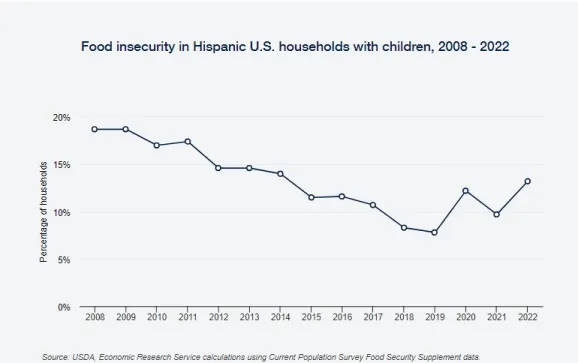
Study: Latinx children more prone to disease due to food insecurity | For Latinx kids, unreliable access to food at age 4 raises the odds of having fatty liver disease in later childhood by nearly four times, a new UC San Francisco-led study found on Thursday. “We’ve seen studies in adults associating food insecurity with fatty liver disease and liver fibrosis, but very few studies have looked at children,” said Sarah Maxwell, MD, a pediatrician currently completing her pediatric transplant hepatology fellowship at UCSF Benioff Children’s Hospitals and the study’s lead author. By Hamza Fahmy for KRON News
For the First Time, the SAT Goes Paperless for Over a Million Students | The revamped test, which ditches the paper and pencil, aims to make cheating harder and grading easier. “Today’s students, they do a lot of their living digitally, they do a lot of their learning digitally, and they do a lot of their test taking digitally,” says Priscilla Rodriguez, who oversees the SAT for the College Board, the organization behind the test. By Elissa Nadworny for NPR
FAFSA submissions from high school seniors are down 38% | Submission rates for the Free Application for Federal Student Aid (FAFSA) among high school seniors have dropped by 38% compared to the previous year, with only about 26.4% of the class of 2024 and 22.5% of students from low-income public high schools submitting the form by late February, possibly influenced by the delayed availability of the FAFSA by the U.S. Department of Education. “This puts colleges at risk of losing admitted students to competitors with lower sticker prices or to colleges that can afford to commit financial aid or merit funds to students before knowing FAFSA results,” analysts wrote. By Natalie Schwartz for K-12 Dive
Biden Calls for Teacher Pay Raises, Expanded Pre-K in State of the Union | Biden’s call for giving public school teachers a raise also included no specifics. It was included in a portion of the address focused on economic fairness, which included a push to raise taxes on the highest income earners to help cover the costs of domestic policy priorities. By Evie Blad for Education Week
Governors’ 2024 Education Priorities: Early Childhood, Curriculum, School Choice, Mental Health – Analysis of 38 State of the State addresses finds substantial investments in education, practical ways to strengthen learning | Governors from both parties largely emphasized education investments and practical strategies to strengthen learning in their 2024 State of the State addresses, with bipartisan support for initiatives such as early childhood education, teacher pay raises, literacy reform, and mental health services, while also proposing measures to improve college access and workforce development; however, issues such as school choice and chronic absenteeism received less attention, and divisions persisted over topics like private school vouchers and education savings accounts. By Bella DiMarco for The74
Lawmakers remain divided over charters during House hearing
During a Wednesday hearing of the House Subcommittee on Early Childhood, Elementary, and Secondary Education, congressional leaders debated the effectiveness and direction of the charter school movement, with points of contention revolving around the need for increased oversight due to closure rates and concerns regarding equity and effectiveness compared to traditional public schools, especially in light of increased parental involvement amid the COVID-19 pandemic. “Charter school growth is accelerating,” said Rep. Aaron Bean, R- Fla., who is chair of the subcommittee. In fact, charter school enrollment continued to grow following the COVID pandemic, building on momentum gained from school building closures and distance learning, according to a 2023 report from Moody’s Investors Service. By Naaz Modan for K-12 Dive
Congress curtails move expanding Pell Grant access for some students | A provision in the short-term funding bill approved by Congress effectively blocks a recent Education Department move that could have expanded access to federal Pell Grants for some students who are financially dependent on their families. Tensions are high between members of Congress and the department over the implementation of the new Free Application for Federal Student Aid (FAFSA). Some lawmakers say the federal agency is doing a poor job of executing the changes in the way Congress intended. Department leaders argue that they are trying to fulfill the law’s goal of providing more financial support to as many students as possible. By Danielle Douglas-Gabriel for Washington Post
Indianapolis Public Schools plans new approach to teaching English learners | More than a quarter of the district’s students are now classified as English language learners — over 6,700 as of late February, an increase of over 2,000 students since 2017-18. Amid a larger push for equity in its Rebuilding Stronger reorganization, the district now plans to reimagine how it serves English language learners. The plan includes assigning each school at least one leading English as a New Language “teacher of record,” responsible for overseeing the school’s English language learner program. It also involves more incentives for staff — including a $2,000 stipend for lead teachers and reimbursement for some English as a New Language teachers who also train to become certified to teach English language arts. “It’s going to be hard, without a doubt,” said Arturo Rodriguez, the district’s director for English as a New Language. “We’re up to the challenge.” By Amelia Pak-Harvey for Chalkbeat
The Complete Guide to the TOEFL – Key differences between TOEFL and IELTS, two popular English language proficiency tests. | To measure language skills, many colleges look at how an applicant fared on a standardized English language assessment. There are also slight differences in length, cost, scores, grading and acceptance rates. One exam option is the Test of English as a Foreign Language, known as TOEFL, which is administered by the Educational Testing Service, a nonprofit that conducts educational research with an emphasis on testing. Some U.S. schools prefer TOEFL over other exams, like the International English Language Testing System, known as IELTS. “So each student will have to look at which schools they’re interested in applying to and determine what that institution will accept,” says Dana Brolley, director of international services at the University of Idaho. By Sarah Wood for U.S. News
NYC Education Dept. sues state over order to pay for charter school’s ‘inflated’ rent
NYC’s Education Department is accusing a Staten Island charter school of “artificially inflating” its rent costs to collect more reimbursement from the city – and it’s taking the state education commissioner to court for greenlighting the arrangement, according to legal filings. In a lawsuit filed last week in Albany Supreme Court, city lawyers allege that Hellenic Classical Charter School took advantage of a state law that requires the city to either offer charter schools space in city-owned buildings or pay for their rent in outside facilities. The arrangement amounts to “self-dealing…in which the School in effect pays itself an artificially inflated sub-rent and pockets the difference,” city lawyers said. Hellenic’s lawyer, Kevin Quinn, argued that the city has no right under the law to “second guess” the price of a charter school’s rent, and that the reason for the increase is irrelevant. By Michael Elsen-Rooney for Chalkbeat NY
Data Science helps students of color opt in for more math | This commentary emphasizes the importance of data science education in Compton Unified School District and criticizes UC’s decision to retract data science courses as counting towards math requirements for college admissions, arguing that it perpetuates exclusivity and denies opportunities for underrepresented students in STEM fields, while advocating for a comprehensive reassessment process involving diverse stakeholders to address gaps in math achievement and engagement. For more insight see piece By Jason Lee Morgan & Kagba Suaray for Ed Source.
In a related commentary by Jennifer Chayes & Jelani Nelson for EdSource tilted Advanced math in high school prepares students for STEM and data science careers, the authors emphasize the increasing importance of data and computer science careers in California and the necessity for the state’s academic systems to educate future leaders in various fields, while acknowledging the importance of foundational math content like Algebra II in adequately preparing students for college degrees requiring strong math backgrounds.
Thousands of Philadelphia students are owed special education services from the pandemic | The Philadelphia school district has fallen way behind schedule in providing thousands of students in special education with extra services they did not receive during the pandemic, according to state officials. According to the complaint, some parents and guardians were still unaware their children were entitled to extra help more than a year after students returned to in-person instruction. Families and advocates fear that many of these students may have suffered lasting damage. “These are students who were most harmed by 15 to 18 months out of school,” said Margie Wakelin, senior attorney at the law center. By Dale Mezzacappa for Chalkbeat
D.C. sued over ‘failure’ to bus kids with disabilities to and from school | A group of D.C. parents, along with a disability rights organization, alleges in a new lawsuit that the city has failed to transport students with special needs to and from school on time — causing disruptions that they say deprive children of critical time in classes or therapies, create daily uncertainties over schedules, and, in some cases, threaten students’ health. By Lauren Lumpkin for The Washington Post

